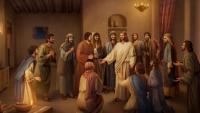
The two disciples have just returned from Emmaus and have joyously shared their experience of seeing Jesus. Luke seems to place great emphasis on Jesus being the fulfilment of the prophecies and the Mosaic law, both in Jesus' discourse with the disciples on the way to Emmaus and with the rest of the disciples gathered in Jerusalem. We are fortunate that Luke chose to write a sequel to his gospel, the Acts of the Apostles, so that the Resurrection and triumph of the Lord and the subsequent preaching of it by his followers form one narrative. We can see the journey of the terrified apostles, who thought they were seeing a ghost, to the confident leaders of the early church, who let nothing stand in the way of letting the world know of God’s plan of salvation.
We really do not know who Luke was. All we do know was that he tells how he had investigated everything carefully from the very first (Luke 1:3). He is therefore a painstaking writer who checks his sources, but he is also a gifted story-teller. As well as being the narrator of the stories of the Good Samaritan and the Prodigal Son, he also told the story of the disciples on the road to Emmaus, using this to show the working of God’s plan. It must have been very helpful for those who were seeking the truth.
“But in fact Christ has been raised from the dead, the first fruits of those who have died. For since death came through a human being, the resurrection of the dead has also come through a human being; for as all die in Adam, so all will be made alive in Christ.” (1 Cor. 15:20-22)